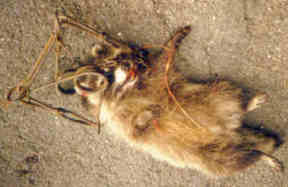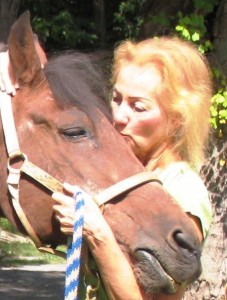President’s Message:
Conibear Traps are Inhumane


In November of 1996, after arriving at work at the police station in the Town of Schodack in Upstate New York, I was informed by one of the other officers that he had just had to destroy an injured raccoon that was crawling on the roadside with a conibear trap caught on its head. The officer brought the young raccoon back to the station. The trap had clamped down across the middle of the animal’s face. I know that the conibear traps are designed to strangle an animal by the neck — if the animal “cooperates” and steps into it the way he is “supposed” to. Either way, when caught in these traps, the excruciating pain creatures are forced to endure is unimaginable. As a wildlife rehabilitator, I have had the experience of seeing other animals killed and mangled in these traps as well as in leghold traps. Animals trapped include not only raccoons, skunks and opossums, but also so called non-target species such as cats, dogs, hawks, owls, etc.
On January 4th, 1997, a dog, Valentine, was caught in a conibear trap while walking with her owner, Meg Messaro, near a public recreational path in Colonie. The trap, which was placed in a bucket, latched onto Valentine’s neck causing her to die a slow painful death before it could be removed by police who came to the dog’s aid.
The New York State Humane Association is strongly opposed to the trapping of wildlife by either conibear or leghold traps. In New York, trappers comprise less than 1{2ca96eb4520404bb9a0db71cfe34d3ddce6228338dfff9697ae8cf2070c96717} of the population. Until these antiquated devices of torture are gone forever, they should at least be kept away from public recreational land routinely used by the rest of the taxpayers, along with their children and pets.
Please speak up against these traps. It is your right as a citizen to contact your representatives either in your local area or in Albany and ask that they do everything possible to prohibit the use of these brutal, primitive devices on public recreational land or better yet, ban them altogether.
Susan C. McDonough
President
New York State Humane Association Humane Review, Vol.XI, No.1, Summer 1997.